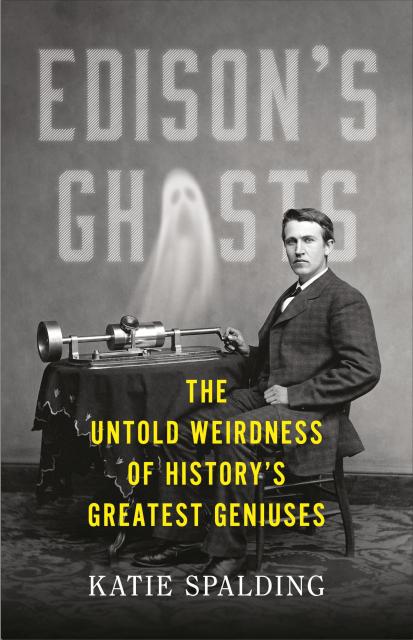Edison’s Ghosts
The Untold Weirdness of History’s Greatest Geniuses
Contributors
Buy from Other Retailers:
- On Sale
- May 16, 2023
- Page Count
- 352 pages
- Publisher
- Little, Brown and Company
- ISBN-13
- 9780316529525
Publishers Weekly Best Summer Reads
Overturn everything you knew about history’s greatest minds in this raucous and hilarious book, where it turns out there’s a finer line between “genius” and “idiot” than we’ve previously known.
- Thomas Edison, inventor of the lightbulb, believed that he could communicate with the undead and built the world’s very first hotline to heaven: the Spirit Phone.
- Marie and Pierre Curie, famous for discovering radioactivity, slept next to a lump of radioactive material for years and strapped it to their arms to watch it burn them in real-time.
- Lord Byron, acclaimed British poet, literally took a bear with him to university.
- Isaac Newton discovered the laws of gravity and motion, but he also looked up at the sun without eye protection. The result? Three days of blindness.
- Tesla, whose scientific work led to the invention of the AC unit, fell in love with a pigeon.
Edison’s Ghosts is filled with examples of the so-called best of humanity doing, to put it bluntly, some really dumb shit. You’ll discover stories that deserve to be told but never are: the hilarious, regrettable, and downright bafflingly lesser-known achievements that never made it into our history books, until now.
Genre:
-
"Author Katie Spalding is a kind of Bill Nye on steroids, making arcane science fascinating and fun...Katie Spalding is one of those annoyingly talented writers. Funny, and with an absurd amount of obscure knowledge, Edison's Ghosts is a must-read on how everyone is much, much stupider than they make out."James Felton, author of Assholes: The Dead People You Should Be Mad at
-
“With wit and charm, each of Katie Spalding’s stories in Edison’s Ghosts nudges, pushes, and eventually shoves some of our most illustrious celebrity thinkers right off their pedestals. Whether it was learning how Pythagorus died from an ill-timed fascination with beans, the career derailing procrastination of Leonardo Da Vinci, the truly impressive-in-its magnitude gullibility of Arthur Conan Doyle, or the failed attempt of the titular Edison to create a phone for calling ghosts, this warts-and-all review of the human, the very silly human, side history’s most famous “geniuses” will fuel your dinner party conversations for years.”David McRaney, author of You Are Not So Smart
-
“Edison's Ghosts is a masterful combination of historical research and comedic storytelling, infused with erudition and judiciously dropped F-bombs. I laughed out loud on nearly every page. It is truly inspiring to read about the stupidity of geniuses. Thank you, Katie, for knocking these wunderkinds down a few pegs and making the rest of us feel smarter in the process.”Justin Gregg, author of If Nietzsche Were a Narwhal
-
“Edison's Ghosts is a lighthearted and amusing account of some of history's most influential people. Even the brightest minds can produce some truly dim moments and this book doesn't hold back.”Nick Caruso, New York Times bestselling author of Does it Fart?
-
"Full of jaw-dropping anecdotes and valuable history lessons, this is a delight."Publishers Weekly
-
“From Pythagoras to Yukio Mishima, first-time author Spalding delivers consistently lively, witty excursions into the sometimes-weird lives and beliefs of the famous…An entertaining and informative collection.”Kirkus Review
-
“An extremely entertaining book...The Leonardo chapter left me helpless with mirth and the Karl Marx one brilliantly tells my favorite "Karl Marx gets pissed” anecdote better than any version I've ever seen. Smart and hilarious."Otto English, author of FAKE HISTORY
-
"Such a great idea I wish I’d come up with it first. One of those books that makes you laugh so much you forget you’re learning stuff."Jonn Elledge, author of The Compendium of (Not Quite) Everything
-
“Wow. It’s rare I pick up a book, read the first page, and immediately know I’m going to love it … I’ve already recommended this book to so many people and when it’s released, I want to drop off a copy to my high school history teacher. You can tell how much research went into each story and what a natural storyteller Dr. Spalding is. I’m a fan for life, I’ll be first in line for whatever comes next…”The Bookloft (Great Barrington, MA)
-
“Until now I thought "enjoyable science book" was an oxymoron. Spalding proved me wrong. I learned a lot and had fun doing it. Turns out a spoonful of snark helps the factoids go down — in a most delightful way.”The Minneapolis Star Tribune
-
"[T]here’s something hopeful about a book setting out to tell us that our fabled geniuses were weirdos and goofballs. It supposes that greatness is still real enough to need demystifying. Spalding teases her subjects because, most of the time, she wants to express what was admirable about them.”Air Mail
-
"When you’re sitting down to read a book by someone with a PhD in mathematics, you don’t expect it to be fun from cover-to-cover, let alone flat-out funny. In fact – and I know that the fine folks at Hachette won’t be able to use this in a blurb – but Dr. Spalding’s book is fucking hilarious!"Anthony Bergen, author of Tributes and Trash Talk
Formats and Prices
Price
$29.00Price
$37.00 CADFormat
Format:
- Hardcover $29.00 $37.00 CAD
- ebook $14.99 $19.99 CAD
- Audiobook Download (Unabridged) $27.99
- Trade Paperback $19.99 $25.99 CAD






